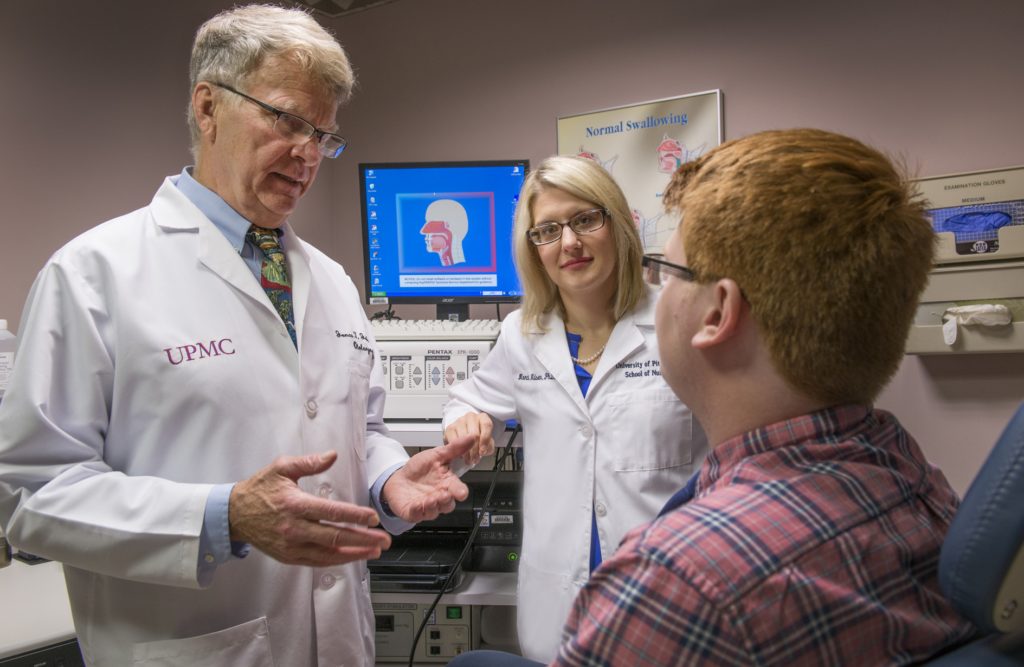Sight + Sound, Spring 2020
by Carrie Fogel
When Marci Nilsen, PhD, RN, Assistant Professor in the Department of Acute and Tertiary Care in the University of Pittsburgh School of Nursing, and Jonas T. Johnson, MD, Chairman of the Department of Otolaryngology at the University of Pittsburgh, began their work to establish the Head and Neck Cancer Survivorship Clinic 2016, they knew that the list of side effects and symptoms related to their treatment was long. Now, having operated the clinic for more than three years, Drs. Johnson and Nilsen are beginning to understand the most common symptoms that patients deal with, and are beginning to turn the data they have collected from their patients into bench to bedside research initiatives.
Dr. Nilsen knew that an important element of the Survivorship clinic was the collection of data using ‘Patient-reported outcomes’ (PROs). According to Dr. Nilsen, “the utilization of PROS encourages the patient to be engaged in their health care and allows their voice to be heard. For providers, this is essential in order to provide high-quality care”. These measures allow for systematic and standardized collection of symptoms and treatment-related effects. The utilization and real-time evaluation of PROs in clinical practice can enhance patient-centered care and help healthcare providers to identify interventions to optimize the results a patient sees in his or her health. The ‘patient-reported outcomes’ process of the clinic visits has provided tremendous insight into the struggles that head and neck cancer (HNC) patients have as they move through life post-treatment.
Drs. Johnson and Nilsen have identified three areas where research studies could provide important knowledge to the rapidly growing field of survivorship medicine: intensive symptoms management, cognitive decline in head and neck cancer patients, and the impact of caregiver burden.
- Intensive Symptoms Management
As the intensity of standard therapy (chemotherapy and radiation) for head and neck cancer has amplified, survivors experience a substantial increase in acute and late treatment-related toxicities. Studies have shown that some patients are hospitalized following treatment once or multiple times. From the data the Survivorship team has collected, they hypothesize that systematic symptom assessment and intensive symptom management will decrease hospital utilization of their patients (i.e., hospital admissions, emergency room visits, inpatient observation).
- Cognitive Impairment after Head and Neck Cancer Treatment
One of the most concerning, yet poorly understood treatment-related effects is reduced cognitive function. Deterioration in cognitive function among cancer survivors is a strong predictor of high symptom-burden, disease recurrence, and morbidity. However, it is unclear whether these deficits in neurocognitive function in HNC survivors are due to population variation, the disease, or the treatment modality superimposed upon a pre-existing cognitive impairment. We intend to study these connections to gain a clearer sense of why this decrease in cognitive ability occurs.
- Caregiver Burden
Patients with head and neck cancer face a diversity of symptoms and functional impairments due to treatment-dependent toxicity. Patient caregivers (CGs) play a vital role in the treatment and recovery process, providing routine care and psychological support. Emotional distress is a problem commonly faced by CGs and can impact not only CGs themselves but their ability to provide care to patients. The survivorship team seeks to determine if there exists a difference in illness perception between patients and CGs and if this difference is associated with increased levels of distress in caregivers.
Because the field of Survivorship is relatively new, it has proven somewhat difficult to find sources for support for research projects aiming to collect pilot data and pose new hypotheses. In the fall of 2019, the Eye & Ear Foundation was granted $100,000 by the Jack Buncher Foundation to launch these research projects to better understand the correlation of these trends relative to head and neck cancer treatment. The Jack Buncher Foundation has long supported important work in the Pittsburgh community, especially in cases where their support can offer assistance to those who are economically disadvantaged or vulnerable to poor health outcomes. I have been told many times that support for unmet needs for individuals who cannot afford care, has been a long standing priority for the Jack Buncher Foundation,” states Lawton Snyder, CEO of the Eye & Ear Foundation.
The support from the Jack Buncher Foundation will allow the Survivorship team to hire a research coordinator to formulate the PRO data into research questions for each of the three areas of focus and will hopefully contribute to the growing body of knowledge that exists about head and neck cancer survivorship, with the ultimate goal of offering patients a more comprehensive plan to continue optimize their life after cancer.
